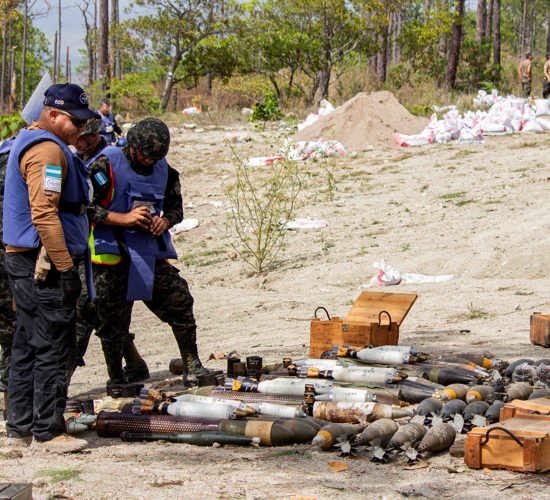In Honduras, security should not be measured only by the presence of police or military forces. Often, the real danger lies hidden behind concrete walls: ageing stockpiles of ammunition and explosives, and weapons depots that – if not managed with properly – can endanger those who have devoted their careers to protecting the country and the communities they serve.
Recognising this challenge, The HALO Trust, with support from the United States, partnered with the Honduran Armed Forces and the Public Prosecutor's Office to promote institutional transformation. This partnership aims to ensure that Honduran institutions have the tools and capacities to manage their stockpiles responsibly, safely and sustainably. This collaboration is yielding visible results.
A key milestone was the implementation of a series of training courses for 20 members of national security institutions. Over the course of a year, participants received instruction on the management, storage, transportation and disposal of small arms, ammunition and explosives, adhering to international standards such as IATG, IMAS and MOSAIC. Importantly, these courses were certified by the Honduran Defense University, ensuring that the knowledge gained will not be confined to a temporary project but instead integrated into the country's formal education and professional development system.

"With HALO, we have developed courses that benefit the population, Honduras and the Armed Forces, because they provide the knowledge to manage, operate and store explosive devices and weapons that, once no longer fit for purpose, can be safely disposed of so they do not harm the public."
In parallel, HALO and the Armed Forces rehabilitated an ammunition storage facility at the Experimental Center for Agricultural Development and Ecological Conservation (CEDACE) in Comayagua. This effort not only transformed a vulnerable building into a secure depot that prevents the diversion of weapons into the hands of criminal networks but also demonstrated Honduras's commitment to protecting its citizens and security personnel.
Another inspiring achievement has been the creation of a national munitions' inspection team, composed of graduates from HALO's training courses. Today, this team travels across the country to inspect military stockpiles, assess risks, recommend improvements, and ensure unsafe munitions are disposed of safely. What began as training has evolved into a national network of professionals capable of strengthening Honduras's own systems for stockpile management.
Thanks to support from the United States, this program is achieving more than immediate results. It is strengthening institutions, fostering national ownership, and building sustainable technical capacity that will endure beyond the life of the project.
The impact of this work extends beyond the borders of Honduras. By reinforcing institutional controls and reducing the risk of diversion, this program contributes to a more stable and secure region. A more stable Central America benefits the United States as well: fewer transnational threats, a reduction in illicit arms flows, and a stronger regional framework to address 21st-century security challenges.
Every rehabilitated depot and every trained professional represent a step toward a country building security on the foundation of stronger, more responsible and professional institutions committed to peace.
In a country where more than 70% of homicides are committed with firearms, initiatives like this not only strengthen institutions, they save lives. Ultimately, responsible weapons and ammunition management reduces human suffering and builds lasting peace.
HALO's life-saving work in Honduras is made possible through generous funding from the United States.


